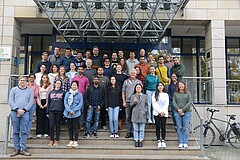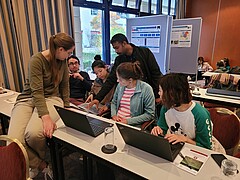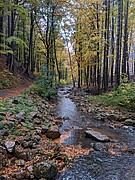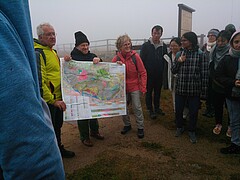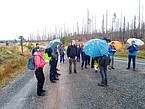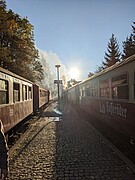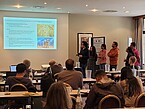Joint Meeting of the Sino-German International Research Training Groups TransTiP, AMAIZE-P and TreeDì [28.10.22]
A first joint meeting of all three DFG-funded Sino-German IRTGs was held in presence from 17-19 October 2022 in the town of Wernigerode, German State of Saxony-Anhalt. A total of 36 (post-) doctoral researchers, plus two spokespersons, a principle investigator and the coordinators from the three “Sister-IRTGs” participated.
The 42 participants from the Universities in Braunschweig (TransTiP), Halle (TreeDì) and Hohenheim (AMAIZE-P) arrived in Wernigerode on 17 October 2022 at noon. In the afternoon, the meeting was officially opened by two of the spokespersons and a coordinator (German side) of the three IRTGs. First agenda item were 3-min flash talks by each (post-)doctoral researcher, with brief self-presentation, including his/her PhD project. In addition to the flash talks, the posters, that had been prepared by the (post-)doctoral researchers on the German side together with their Chinese counterparts for the DFG online evaluations of the IRTGs a few months earlier, were put up on poster boards to discuss their research topics in more detail.
Thereafter, each of the (post-)doctoral researchers was assigned into one of six breakout groups. Two groups always had the same topic, respectively, reflecting the overarching topic of each of the three IRTGs. Key questions and introductory literature, provided in a hand-out in advance, helped the participants to familiarise themselves quickly with the topics. In these multidisciplinary teams the key questions were then jointly discussed, the current knowledge base consolidated and potential research gaps identified. This helped build a consistent and comprehensive view from all insights.
On 18 October, a whole-day excursion to the Brocken, Harz Mountains summit and highest elevation in N Germany, took place. A comprehensive reader on the geography, geology and vegetation of Mt. Brocken had been compiled in advance by the German spokesperson of TreeDì. The largest group made a hiking tour from Ilsenburg (267 m.a.s.l.) to the Brocken at 1,142 m.a.s.l.) on the Heinrich Heine Trail (10.5 km distance). Non-hikers took the Brocken train (one-meter gauge light railway with steam engine) departing in Wernigerode and arriving at Mount Brocken after less than two hours. Lunch was taken at the top of the Brocken in a restaurant or snack bar. In the afternoon, short talks about the geology, soil and vegetation of Mt. Brocken were held by two spokespersons and a coordinator from the three IRTGs. Thereafter, the botanical garden “Brockengarten” was visited, guided by the head of the garden, biologist Dr. Gunter Karste. The flora on Mt. Brocken is characterized by many alpine elements. A National Park was established on the Brocken in 1989, in one of the last legal acts by the former GDR parliament (Volkskammer), which became part of the German reunification treaty. Finally, the whole group returned from Mt. Brocken to Wernigerode by train in the late afternoon.
On the last day (19 October), the working groups gave their feedback in six 15-min presentations, summarizing their discussions, sharing their key findings and showing how multidisciplinary research could help to address pressing environmental issues. Each group presentation was followed by a lively discussion. The three-day meeting ended with a synthesis and closing remarks. The meeting also offered a good occasion for networking amongst the (post-)doctoral researchers. It was agreed that similar meetings between the three “Sister-IRTGs” should be organized in the future. Departure from Wernigerode to the respective “home universities” was in the early afternoon.

